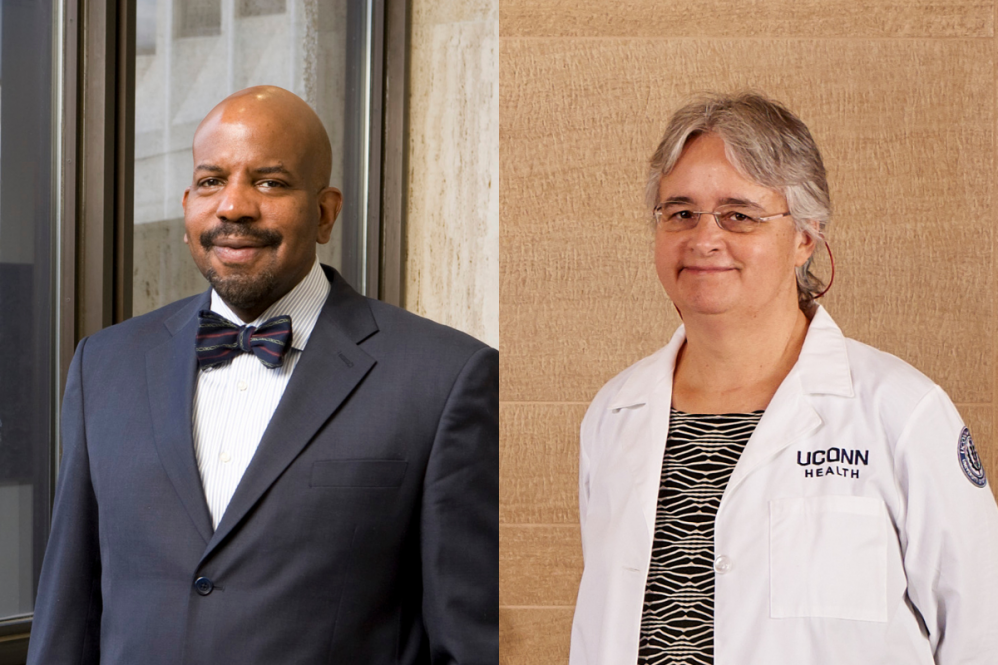The University of Connecticut and its UConn School of Medicine are proud to report the election of two more of its top scientists to the prestigious U.S. National Academy of Sciences. Laurinda A. Jaffe, Ph.D. and Cato T. Laurencin, M.D., Ph.D. were both elected in recognition of their distinguished and continuing achievements in original research.
This year’s historic 120-member NAS class is for the first time half women and includes a new height of nine newly elected Black scientists. According to NAS, just a decade ago only about one-quarter were women in each class, and historically no more than three Black scientists were annually elected.
Jaffe is professor and chair of the Department of Cell Biology at UConn School of Medicine. Her pioneering NIH-funded research has revealed several major advances in scientific understanding of fertility. Her research has identified physiological mechanisms that control young ovarian cells called oocytes and their communication patterns with other cells. Jaffe is widely credited for uncovering developmental processes that produce a fertilization-competent oocyte, and that initiate embryonic development upon fertilization. For example, one of her scientific discoveries was that following fertilization a change in electrical voltage across an egg’s surface renders it refractory to fusion with additional sperm.
Laurencin’s National Academy of Sciences election makes him the first surgeon in history to be elected to all three national academies of NAS, National Academy of Engineering, and the National Academy of Medicine. He is the University Professor at UConn and the Albert and Wilda Van Dusen Distinguished Professor of Orthopaedic Surgery at UConn School of Medicine. As the founder of the field of regenerative engineering, his NIH-funded research focuses on the convergence of advanced materials science including nanotechnology, biophysics, medicine, and developmental biology. A pioneer in polymeric materials science for musculoskeletal systems his research successes include the regeneration of complex tissues. He is the recipient of the National Medal of Technology and Innovation, our nation’s highest honor for technological achievement.
“National Academy of Sciences membership is the highest honor a scientist can be awarded,” says Dr. Bruce T. Liang, dean of UConn School of Medicine. “Congratulations to Dr. Jaffe and Dr. Laurencin for their research excellence, their amazing accolades, and their leadership on the national stage for the University and our medical school.”
“We are so proud that Dr. Jaffe and Dr. Laurencin’s pivotal contributions to science have been recognized by the National Academy,” says UConn President Thomas Katsouleas. “The UConn School of Medicine is now home to three elected members of the National Academy of Sciences. It’s only onward and upward from here as we build upon this national recognition of our talented UConn faculty.”
The School of Medicine’s three NAS members are now Jaffe, Laurencin, and Se-Jin Lee, M.D., Ph.D., the Presidential Distinguished Professor in the Department of Genetics and Genome Sciences who holds a joint faculty appointment with The Jackson Laboratory for Genomic Medicine. Lee was elected in 2012 for his research contributions in the field of medical physiology and metabolism.
The National Academy of Sciences was established under a congressional charter signed by President Abraham Lincoln in 1863. It recognizes achievement in science by election to membership, and—with the National Academy of Engineering and the National Academy of Medicine—provides science, engineering, and health policy advice to the federal government and other organizations.
Elite NAS membership totals only 2,461 members and 511 international members, of which approximately 190 have received Nobel prizes. Members include experts from six scientific disciplines of physical and mathematical sciences, biological sciences, engineering and applied sciences, biomedical sciences, behavioral and social sciences, and applied biological, agricultural, and environmental sciences.
Jaffe received her Ph.D. in biology from the University of California, Los Angeles. She completed postdoctoral training in cell biology at the Woods Hole Marine Biological Laboratory and the University of California, San Diego.
Laurencin received his B.S.E in chemical engineering from Princeton University, his M.D., magna cum laude from the Harvard Medical School, and his Ph.D. in biochemical engineering/biotechnology from the Massachusetts Institute of Technology. He is also CEO of The Connecticut Convergence Institute for Translation in Regenerative Engineering, and professor of chemical engineering, materials sciences, and biomedical engineering at UConn.
“I am pleased to welcome all of our new members, and I look forward to engaging with them in the work of the National Academies,” says Marcia McNutt, president of the National Academy of Sciences.
This year UConn is one of only 25 institutions to have two scientists elected to NAS. UConn’s researchers will be formally inducted next spring at the Academy’s 2022 NAS Annual Meeting.



